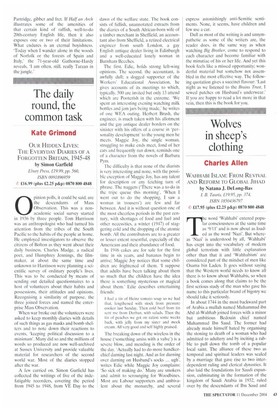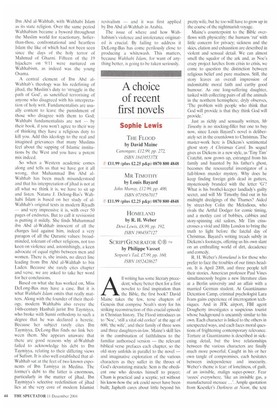Wolves in sheep's clothing
Charles Allen
WAHHABI ISLAM: FROM REVIVAL AND REFORM TO GLOBAL JIHAD by Natana J. DeLong-Bas I. B. Tauris, £19.95, pp. 374, ISBN 185043679 7 ® E17.95 (plus £2.25 p&p) 0870 800 4848 The word 'Wahhabi' entered popular consciousness at the same time as '9/11' and is now about as loaded as the word 'Nazi'. But whereas 'Nazi' is understood by all, `Wahhabf has crept into the vocabulary of modern global terrorism with little explanation other than that it and `Wahhabism' are considered part of the mindset of men like Osama bin Laden. It goes without saying that the Western world needs to know all there is to know about Wahhabis, so when a book comes along that claims to be the first serious study of the man who gave his name to this particular brand of bigotry we should take it seriously.
In about 1744 in the most backward part of Arabia a mullah named Muhammad ibn Abd al-Wahhab joined forces with a minor but ambitious Bedouin chief named Muhammad Ibn Saud. The former had already made himself hated by organising the stoning to death of a woman who had admitted to adultery and by inciting a rabble to pull down the tomb of a popular local saint. The alliance of these two as temporal and spiritual leaders was sealed by a marriage that gave rise to two interdependent ruling and clerical dynasties. It also laid the foundations for Saudi expansion, culminating in the formation of the kingdom of Saudi Arabia in 1932, ruled over by the descendants of Ibn Saud and Ibn Abd al-Wahhab, with Wahhabi Islam as its state religion. Over the same period Wahhabism became a byword throughout the Muslim world for reactionary, holierthan-thou, confrontational and heartless Islam the like of which had not been seen since the days of the holy terror of Mahmud of Ghazni. Fifteen of the 19 hijackers on 9/11 were nurtured on Wahhabism, as indeed was the young Osama.
A central element of Ibn Abd alWahhab's theology was his redefining of jihad, the Muslim's duty to 'struggle in the path of God', as sanctified terrorising of anyone who disagreed with his interpretation of holy writ. Fundamentalists are usually content to leave the punishment of those who disagree with them to God; Wahhabi fundamentalists are not — by their hook, if you won't agree to their way of thinking they have a religious duty to kill you. Add this ideology to the real and imagined grievances that many Muslims feel about the sapping of Islamic institutions by the West and you have a potent mix indeed.
So when a Western academic conies along and tells us that we have got it all wrong, that Muhammad Ibn Abd alWahhab has been much misunderstood and that his interpretation of jihad is not at all what we think it is, we have to sit up and listen. Natana J. Delong-Bas's Wahhabi Islam is based on her study of alWahhab's original texts in modern Riyadh — and very impressive it is, with over 50 pages of endnotes. But to call it revisionist is putting it mildly. She finds Muhammad ibn Abd al-Wahhab innocent of all the charges laid against him, indeed a very paragon of all the Ouranic values: broadminded, tolerant of other religions, not too keen on violence and, astonishingly, a keen advocate of equal rights between men and women. There is, she insists, no direct line leading from Ibri Abd al-Wahhab to bin Laden. Because she rarely cites chapter and verse, we are asked to take her word for her conclusions.
Based on what she has worked on, Miss DeLong-Bas may have a case. But it is what Wahhabi Islam omits that really matters. Along with the founder of their theology, modern Wahhabis also revere the 14th-century Hanbali jurist Ibn Taymiyya, who broke with Sunni orthodoxy to such a degree that he was declared a heretic. Because her subject rarely cites Ibn Taymiyya, Del_Amg-Bas finds no link between them. She appears unaware that there are good reasons why al-Wahhab failed to acknowledge his debt to Ibn Taymiyya, relating to their differing views of Sufism. It is also well established that alWahhab sat at the feet of two known exponents of Ihn Tamiyya in Medina. The former's debt to the latter is enormous, particularly in the matter of jihad. Ihn Taymiyya's selective redefinition of jihad lies at the very core of modern Islamist revivalism — and it was first applied by Ibn Abd al-Wahhah in Arabia.
The issue of where and how Wahhabism's violence and intolerance originated is crucial. By failing to address it DeLong-Bas has come perilously close to producing a whitewash. This matters, because Wahhabi Islam, for want of anything better, is going to be taken seriously.











































































 Previous page
Previous page